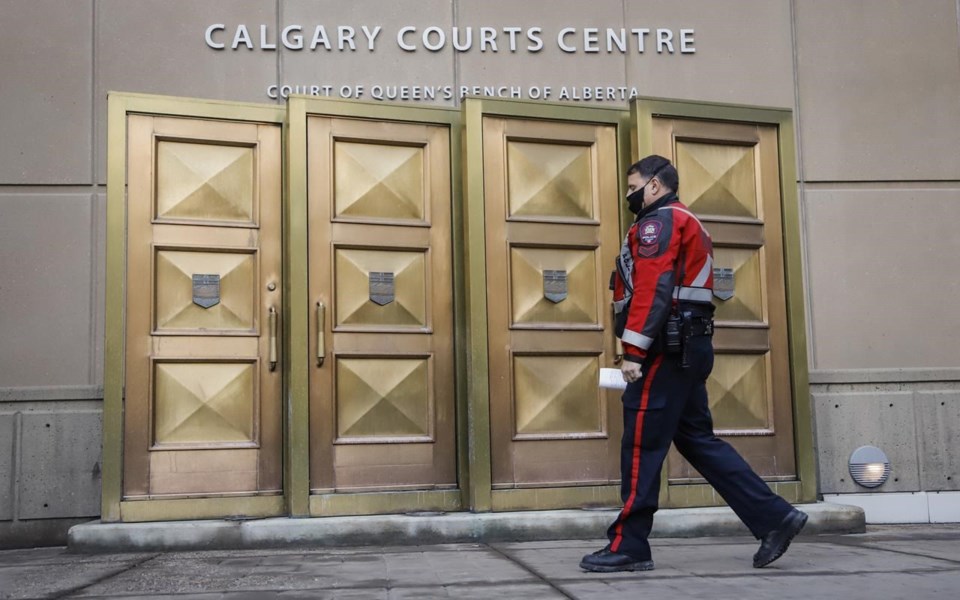CALGARY — A 17-year-old Calgarian who was arrested as part of a national security investigation is to be prohibited from accessing social media and required to participate in an intervention plan that addresses ideological extremism.
The teenage boy, who cannot be identified under the Youth Criminal Justice Act, was arrested in June and was subject to a section of the Criminal Code that allows for a peace bond if there's fear the person may commit a terrorism offence.
He has been out of custody with conditions since his arrest, and appeared in court Monday with his lawyer and his parents for the peace bond hearing.
Court heard details of the teen's social media use on sites such as TikTok, Instagram and Snapchat, including a video of him attending an LGBTQ protest where he taped himself saying "kill all (gay people)" and another that depicted blowing up a synagogue.
RCMP Const. Trevor Checkley of the Integrated National Security Enforcement Teams testified that there were many other Islamic State group and terrorist videos on his computer and phone.
The teen "was interviewed by members of the RCMP," he told court after being called to the stand by Crown prosecutors. "During that interview, (he) mentioned that he believed the gay community was the greatest threat ...
"He felt that people were trying to ruin his religion and he did not want that to happen and he admitted to posting material online advocating for the killing of (gay people)."
Checkley also testified that the teen was in a Snapchat group with a title that was translated to "Islamic State Soldiers of Allah" with 17 other people.
"Within the chat, participants shared media, photographs and videos related to Islamic State recruiting, propaganda videos, suicide bombers, videos with men being thrown off buildings to their deaths," he said. "(The teen) himself posted to the group an image showing a beheading."
The group, he said, also included 20-year-old Zakarya Hussein, who was charged as part of the same national security investigation.
Earlier this month, Hussein pleaded guilty to one terrorism charge after admitting he shared recruitment videos for the Islamic State group on TikTok, wrote out instructions on how to make a bomb and posted on Snapchat that his mission would begin during Pride month.
Hussein is to be sentenced in 2024 following a risk assessment report ordered by his lawyer.
A threat assessment was also prepared for the 17-year-old and court heard Monday that a report concluded he was "a moderate risk to the Canadian public and a high risk of joining an extremist group."
The report added that the teen had a "pathological fixation with Islamic extremist ideology, violence and weapons."
His lawyer, Vignesh Pillai, acknowledged the facts and said he wasn't opposed to the application.
"The threshold for a terrorism peace bond is much lower than that of a regular peace bond," he told court. "The assessment here is whether the person may commit an offence.
"Part of that reason is to permit early intervention for those who may be transitioning toward committing a terrorist offence."
Pillai said there was some concerning content found on his client's electronic devices, but there's no evidence he had planned a terrorist attack or was an imminent threat.
"This is someone who could be heading down a pretty troubling and concerning path without proper intervention," he said.
The threat assessment, he said, also notes that his client is impressionable, has a weak sense of self-identity and may be struggling to cope with some family issues.
"This peace bond hopefully will provide the intervention needed to assist this young person in getting him off the path toward radicalization," said Pillai.
Other conditions, he noted, include reporting to probation, not accessing terrorist-type literature, not associating with anyone believed to be associated with terrorist activity and not attending any LGBTQ events or any synagogue.
Justice John Shaw accepted the terms, which are to be in place for 12 months, although he agreed to remove a condition requiring the teen to abide by a curfew after Pillai argued that most of the activity happened online.
"There's no evidence to suggest he's meeting with other like-minded people outside his home," said the judge. "This is a lone wolf alone at his computer supporting, believing, transmitting hate literature.
"I rather suspect he will not be alone in his communications for some time."
Shaw agreed to review a social media ban in eight months to check whether the teen is complying with that condition.
Court is to resume on Thursday afternoon for the judge to finalize the peace bond and its conditions.
A 15-year-old youth, who was arrested in October as part of the ongoing national security investigation, is scheduled to have a similar hearing in January.
This report by The Canadian Press was first published Dec. 11, 2023.
Colette Derworiz, The Canadian Press




